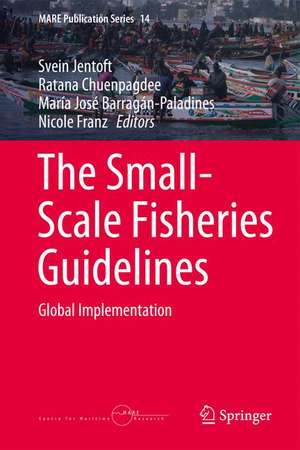The Small-Scale Fisheries Guidelines: Global Implementation: MARE Publication Series, cartea 14
Editat de Svein Jentoft, Ratana Chuenpagdee, María José Barragán-Paladines, Nicole Franzen Limba Engleză Hardback – 26 iun 2017
In June 2014, FAO member-states endorsed the Voluntary Guidelines for Securing Sustainable Small-Scale Fisheries (SSF Guidelines). These Guidelines are one of the most significant landmarks for small-scale fisheries around the world. They are comprehensive in terms of topics covered, and progressive, with their foundations based on human rights and other key principles. It can be anticipated that implementing the SSF Guidelines, whether at local, national, or regional levels, will be challenging. This book contains in-depth case studies where authors discuss the extent to which the Guidelines can help improve the realities of small-scale fishing men and women globally and make their livelihoods and communities more secure. This will require policy intervention and innovation, along with contributions of civil society organizations and academia. However, most of all it will necessitate the empowerment of fishing people so that they can become active participants in decision makingon matters where their well-being and human rights are at stake. By endorsing the SSF Guidelines, states have committed themselves to support and facilitate this development. This book asks whether states can successfully “walk the talk,” and provides advice as to how they can do so.
The collection of case studies sets the platform for an interactive dialogue space for researchers, policy makers, civil society and small-scale fishing communities to start the conversation about the monitoring and evaluation of the implementation of the SSF Guidelines at local, national, regional and global levels. An added value is that it helps add focus to our work as civil society activists involved in ensuring the application of the SSF Guidelines.Naseegh Jaffer – General Secretary, World Forum of Fisher People (WFFP)
This collection offers many ways in which institutions enabling small-scale fisheries can protect and promote sustainability, food security, customary tenure, self-management, and market access, while fostering such benefits as ecosystem-based management, protected areas, incorporation of local knowledge, and poverty alleviation. You will want to put this book in the hands of policy-makers and practitioners immediately -- and for years to come.Evelyn Pinkerton – Professor, Simon Fraser University, Canada
This collection offers many ways in which institutions enabling small-scale fisheries can protect and promote sustainability, food security, customary tenure, self-management, and market access, while fostering such benefits as ecosystem-based management, protected areas, incorporation of local knowledge, and poverty alleviation. You will want to put this book in the hands of policy-makers and practitioners immediately -- and for years to come.Evelyn Pinkerton – Professor, Simon Fraser University, Canada
| Toate formatele și edițiile | Preț | Express |
|---|---|---|
| Paperback (1) | 729.27 lei 38-44 zile | |
| Springer International Publishing – 22 iun 2018 | 729.27 lei 38-44 zile | |
| Hardback (1) | 754.95 lei 17-23 zile | +65.01 lei 10-14 zile |
| Springer International Publishing – 26 iun 2017 | 754.95 lei 17-23 zile | +65.01 lei 10-14 zile |
Din seria MARE Publication Series
-
 Preț: 432.33 lei
Preț: 432.33 lei -
 Preț: 408.16 lei
Preț: 408.16 lei -
 Preț: 401.79 lei
Preț: 401.79 lei - 18%
 Preț: 805.92 lei
Preț: 805.92 lei -
 Preț: 397.38 lei
Preț: 397.38 lei - 23%
 Preț: 701.38 lei
Preț: 701.38 lei - 18%
 Preț: 727.97 lei
Preț: 727.97 lei -
 Preț: 284.93 lei
Preț: 284.93 lei - 24%
 Preț: 918.26 lei
Preț: 918.26 lei - 15%
 Preț: 645.79 lei
Preț: 645.79 lei - 18%
 Preț: 974.98 lei
Preț: 974.98 lei - 20%
 Preț: 511.76 lei
Preț: 511.76 lei -
 Preț: 388.90 lei
Preț: 388.90 lei - 19%
 Preț: 553.61 lei
Preț: 553.61 lei -
 Preț: 388.31 lei
Preț: 388.31 lei - 23%
 Preț: 757.22 lei
Preț: 757.22 lei - 18%
 Preț: 887.86 lei
Preț: 887.86 lei - 15%
 Preț: 645.47 lei
Preț: 645.47 lei -
 Preț: 391.99 lei
Preț: 391.99 lei - 15%
 Preț: 650.37 lei
Preț: 650.37 lei
Preț: 754.95 lei
Preț vechi: 993.35 lei
-24% Nou
Puncte Express: 1132
Preț estimativ în valută:
144.46€ • 151.23$ • 119.53£
144.46€ • 151.23$ • 119.53£
Carte disponibilă
Livrare economică 11-17 martie
Livrare express 04-08 martie pentru 74.100 lei
Preluare comenzi: 021 569.72.76
Specificații
ISBN-13: 9783319550732
ISBN-10: 331955073X
Pagini: 858
Ilustrații: XXII, 858 p. 74 illus., 62 illus. in color.
Dimensiuni: 155 x 235 mm
Greutate: 1.63 kg
Ediția:1st ed. 2017
Editura: Springer International Publishing
Colecția Springer
Seria MARE Publication Series
Locul publicării:Cham, Switzerland
ISBN-10: 331955073X
Pagini: 858
Ilustrații: XXII, 858 p. 74 illus., 62 illus. in color.
Dimensiuni: 155 x 235 mm
Greutate: 1.63 kg
Ediția:1st ed. 2017
Editura: Springer International Publishing
Colecția Springer
Seria MARE Publication Series
Locul publicării:Cham, Switzerland
Cuprins
Part 1. Vision and Ambition.- Chapter 1. Implementing the Voluntary Guidelines for Securing Small-Scale Fisheries (Svein Jentoft, Ratana Chuenpagdee, Nicole Franz, and Maria Jose Barragán-Paladines).- Chapter 2. A Human Rights-Based Approach to Securing Small-Scale Fisheries: A Quest for Development as Freedom (Rolf Willmann, Nicole Franz, Carlos Fuentevilla, Thomas McInerney and Lena Westlund).- Chapter 3. The Small-Scale Fisheries Guidelines: A First Account of Developments since Their Endorsement in 2014 (Nicole Franz and Maria Jose Barragán-Paladines).- PART 2. Politics of Transformation.- Chapter 4. Policy Coherence with the Small-Scale Fisheries Guidelines: Analysing Across Scales of Governance in Pacific Small-Scale Fisheries (Philippa Cohen, Andrew M. Song, and Tiffany H. Morrison).- Chapter 5. Tuna or Tasi? Fishing for Policy Coherence in Zanzibar’s Small-Scale Fisheries Sector (Lars Lindström and Maricela de la Torre-Castro).- Chapter 6. Pernicious Harmony: Greenland and theSmall-Scale Fisheries Guidelines (Hunter T. Snyder, Rikke Becker Jacobsen, and Alyne Delaney).- Chapter 7. Walking the Talk of the Small-Scale Fisheries Guidelines in Jamaica (Lisa K. Soares).- PART 3. Securing Tenure Rights.- Chapter 8. Expressions of Tenure in South Africa in the Context of the Small-Scale Fisheries Guidelines (Jackie Sunde).- Chapter 9. Conditions for Governance of Tenure in Lagoon-Based Small-Scale Fisheries, India (Prateep Kumar Nayak).- Chapter 10. Beyond the Small-Scale Fisheries Guidelines: Tenure Rights and Informed Consent in Indigenous Fisheries in Nicaragua (Miguel Gonzales).- Chapter 11. Are the Small-Scale Fisheries Guidelines Sufficient to Halt the Fisheries Decline in Malta? (Alicia Said).- PART 4. Strengthening the Resource Base.- Chapter 12. Laying Foundations for Ecosystem-based Fisheries Management with the Small-Scale Fisheries Guidelines: Lessons from Australia and Southeast Asia (James Prescott and Dirk J. Steenbergen).- Chapter 13. Securing Sustainable Sami Small-Scale Fisheries in Norway: Implementing the Guidelines (Svein Jentoft and Siri U. Søreng).- Chapter 14. Protections for Small-Scale Fisheries in India: A Study of India’s Monsoon Fishing Ban (Surathkal Gunakar, Adam Jadhav, and Ramachandra Bhatta).- Chapter 15. Implementing the Small-Scale Fisheries Guidelines: Lessons from Japan (Alyne Delaney and Nobuyuki Yagi).- Part 5. Empowerment and Collective Action.- Chapter 16. Value Chain Challenges in Two Community-Managed Fisheries in Western Madagascar: Insights for the Small-Scale Fisheries Guidelines (Charlie J. Gardner, Charlotte Gough, Adrian Levrel, Rebecca L. Singleton, Steve Rocliffe, Xavier Vincke, and Alasdair Harris).- Chapter 17. Costa Rica: A Champion of the Small-Scale Fisheries Guidelines (Gabriela Sabau).- Chapter 18. Furthering the Implementation of the Small-Scale Fisheries Guidelines: Strengthening Fisheries Cooperatives in Sri Lanka (Oscar Amarasinghe and Maarten Bavinck).- Chapter 19. The Small-ScaleFisheries Guidelines as a Tool for Marine Stewardship: The Case of Cap de Creus Marine Protected Area, Spain (Silvia Gómez Mestres and Josep Lloret Romañach).- Part 6. Broadening Participation.- Chapter 20. Civil Society Contributions to the Implementation of the Small-Scale Fisheries Guidelines in Mexico (María José Espinosa-Romero, Jorge Torre, José Alberto Zepeda, Francisco Vergara-Solana, and Stuart Fulton).- Chapter 21. Caribbean Fisherfolk Engage the Small-Scale Fisheries Guidelines (Patrick McConney, Terrence Phillips, Nadine Nembhard, and Mitchell Lay).- Chapter 22. Implementing the Small-Scale Fisheries Guidelines: Lessons from Brazilian Clam Fisheries (Sérgio Macedo G. de Mattos, Matias John Wojciechowski, Alison Elisabeth Macnaughton, Gustavo Henrique G. da Silva, Allyssandra Maria Lima R. Maia, and Joachim Carolsfeld).- Chapter 23. The Step Zero for Implementing the Small-Scale Fisheries Guidelines in Newfoundland and Labrador, Canada (Ratana Chuenpagdee, Kim Olson,David Bishop, Meike Brauer, Vesna Kereži, Joonas Plaan, Sarah Pötter, Victoria Rogers, and Gabriela Sabau).- Part 7. Managing Threats.- Chapter 24. Addressing Disaster Risks and Climate Change in Coastal Bangladesh: Using the Small-Scale Fisheries Guidelines (Mohammad Mahmudul Islam and Svein Jentoft).- Chapter 25. Closing Loopholes with the Small-Scale Fisheries Guidelines: Addressing Illegal, Unreported and Unregulated Fishing in Lake Victoria, Tanzania (Joseph Luomba, Paul Onyango, and Ratana Chuenpagdee).- Chapter 26. Illegal, Unreported and Unregulated Fisheries in the Hormuz Strait of Iran: How the Small-Scale Fisheries Guidelines Can Help (Moslem Daliri, Svein Jentoft, and Ehsan Kamrani).- Chapter 27. The Role of the Small-Scale Fisheries Guidelines in Reclaiming Human Rights for Small-Scale Fishing People in Colombia (Lina Maria Saavedra-Díaz and Svein Jentoft).- Part 8.- Building Capacity.- Chapter 28. Challenges and Opportunities in Implementing the Small-Scale Fisheries Guidelines in the Family Islands, Bahamas (Kate Kincaid).- Chapter 29. Supporting the Small-Scale Fisheries Guidelines Implementation in Senegal: Alternatives to Top-Down Research (Aliou Sall and Cornelia E. Nauen).- Chapter 30. Applying the Small-Scale Fisheries Guidelines in Nigeria: Status and Strategies for Badagry Coastal and Creek Fisheries (Shehu Latunji Akintola, Kafayat Adetoun Fakoya, and Olufemi Olabode Joseph).- Chapter 31. Building Capacity for Implementing the Small-Scale Fisheries Guidelines: Examples from the Pacific and the Caribbean Small Island Developing States (Zahidah Afrin Nisa).- Part 9. Governing From Principles.- Chapter 32. Aligning with the Small-Scale Fisheries Guidelines: Policy Reform for Fisheries Sustainability in Thailand (Ratana Chuenpagdee, Kungwan Juntarashote, Suvaluck Satumanatpan, Wichin Suebpala, Makamas Sutthacheep, and Thamasak Yeemin).- Chapter 33. The Buen Vivir and the Small-Scale Fisheries Guidelines in Ecuador: A Comparison (Maria JoseBarragán-Paladines).- Chapter 34. Addressing Social Sustainability for Small-Scale Fisheries in Sweden: Institutional Barriers for Implementing the Small-Scale Fisheries Guidelines (Milena Arias Schreiber, Filippa Säwe, Johan Hultman, and Sebastian Linke).- Chapter 35. Promoting Gender Equity and Equality through the Small-Scale Fisheries Guidelines: Experiences from Multiple Case Studies (Danika Kleiber, Katia Frangoudes, Hunter Snyder, Afrina Choudhury, Steven M Cole, Kumi Soejima, Cristina Pita, Anna Santos, Cynthia McDougall, Hajnalka Petrics, and Marilyn Porter).- Part 10. Moving Forward.- Chapter 36. A Human Rights-Based Approach in Small-Scale Fisheries: Evolution and Challenges in Implementation (Rolf Willmann, Nicole Franz, Carlos Fuentevilla, Thomas McInerney, and Lena Westlund).- Chapter 37. From Rhetoric to Reality: Implementing the Voluntary Guidelines for Securing Sustainable Small-Scale Fisheries (Svein Jentoft and Ratana Chuenpagdee).
Recenzii
“This book is an essential read for any academic, manager, or policymaker concerned with improving the performance of small-scale fisheries and the well-being of associated fishing communities. … The SSF Guidelines may prove, as extensively showcased throughout the chapters of this book, to be the catalyst for a global attitude and policy shift to finally recognize the rights of fisherfolk throughout the world, and ensure that their work and ways of life are not only tolerated, but cherished.” (Andrés Cisneros- Montemayor, Samudra Report, Issue 79, August, 2018)
Textul de pe ultima copertă
In June 2014, FAO member-states endorsed the Voluntary Guidelines for Securing Sustainable Small-Scale Fisheries (SSF Guidelines). These Guidelines are one of the most significant landmarks for small-scale fisheries around the world. They are comprehensive in terms of topics covered, and progressive, with their foundations based on human rights and other key principles. It can be anticipated that implementing the SSF Guidelines, whether at local, national, or regional levels, will be challenging. This book contains in-depth case studies where authors discuss the extent to which the Guidelines can help improve the realities of small-scale fishing men and women globally and make their livelihoods and communities more secure. This will require policy intervention and innovation, along with contributions of civil society organizations and academia. However, most of all it will necessitate the empowerment of fishing people so that they can become active participants in decision makingon matters where their well-being and human rights are at stake. By endorsing the SSF Guidelines, states have committed themselves to support and facilitate this development. This book asks whether states can successfully “walk the talk,” and provides advice as to how they can do so.
The collection of case studies sets the platform for an interactive dialogue space for researchers, policy makers, civil society and small-scale fishing communities to start the conversation about the monitoring and evaluation of the implementation of the SSF Guidelines at local, national, regional and global levels. An added value is that it helps add focus to our work as civil society activists involved in ensuring the application of the SSF Guidelines.Naseegh Jaffer – General Secretary, World Forum of Fisher People (WFFP)
This collection offers many ways in which institutions enabling small-scale fisheries can protect and promote sustainability, food security, customary tenure, self-management, and market access, while fostering such benefits as ecosystem-based management, protected areas, incorporation of local knowledge, and poverty alleviation. You will want to put this book in the hands of policy-makers and practitioners immediately -- and for years to come.Evelyn Pinkerton – Professor, Simon Fraser University, Canada
This collection offers many ways in which institutions enabling small-scale fisheries can protect and promote sustainability, food security, customary tenure, self-management, and market access, while fostering such benefits as ecosystem-based management, protected areas, incorporation of local knowledge, and poverty alleviation. You will want to put this book in the hands of policy-makers and practitioners immediately -- and for years to come.Evelyn Pinkerton – Professor, Simon Fraser University, Canada
Caracteristici
Presents timely implementation research on a landmark instrument in fisheries governance Identifies implementation challenges and potential stumbling blocks Looks forward and offers creative pathways to implementation Shares lessons and experiences from around the world














